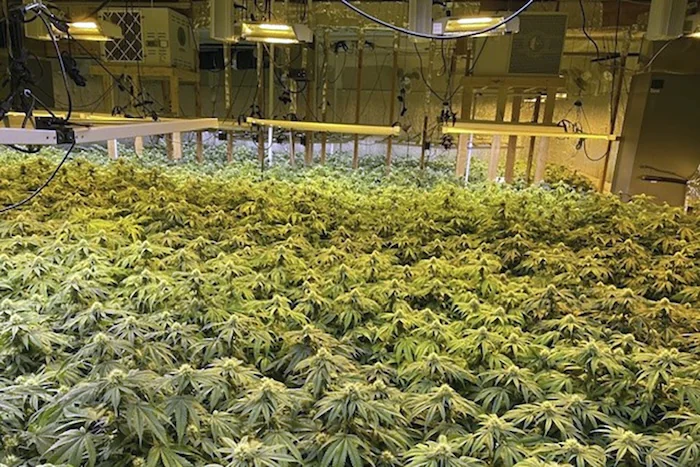Chinese financiers and operators are behind a surge of illegal marijuana grow operations that have sprung up across Maine, according to Sen. Susan Collins (R-ME).
Collins has led the charge to stand up a joint federal, state, and local operation to take down the hundreds of confirmed grow houses in her backyard. Since 2022, her small New England home state has had 270 confirmed illegal marijuana grow operations uncovered by authorities, but Collins is particularly concerned with who is behind them.
“It is a marijuana operation, illegally operated by a transnational Chinese criminal organization, and likely with the knowledge of the Chinese Communist Party,” Collins told the Washington Examiner. “This was very disturbing.”
Collins has finally started to see meaningful progress made in the months since President Donald Trump took office, but getting here has been a yearslong effort that Collins and others involved shared the details of.
The unexpected pops up
Until recently, rural Central Maine was a hub for the grow houses, and Maine itself was a national leader for states affected by this type of crime.
Unlike in other leading states for illegal marijuana grow operations, such as California and Oklahoma, where Latin criminal organizations known as cartels were behind the operations, that was not the case in Maine. Chinese workers staffed these and, as investigations would reveal, they were run and financed by Chinese businessmen, according to Collins and the Drug Enforcement Administration.
Trouble first appeared on Collins’s radar in June 2022, when she was contacted by a constituent about suspicious activity at a nearby home. Collins began working with the DEA around that time to get federal law enforcement involved.
Collins said that Sheriff Dale Lancaster of Somerset County also received a high volume of public reports of heavy traffic going in and out of homes in the countryside. Lancaster could not be reached for comment.
Local authorities began sharing their observations: homes with electric bills higher than a motel’s, unusual smells around certain houses, lots of Chinese people coming and going all at once every few weeks in a predominantly white area, according to Richard LaBelle, town manager for Norridgewock, Maine’s 3,300 residents.
“They purchased these homes. Some of them were cash. Some of them they had mortgages on, and they were coming in and not seeking any permits or anything like that. They were just retrofitting these homes,” LaBelle said.
“You were seeing commercial electricity drops brought into the homes. They were covering windows, doors, and walls with insulation,” LaBelle said. “They were really setting up these makeshift grows. Some folks were distributing. Some folks were cultivating.… some of these buildings were primarily housing.”
Marijuana’s legality in Maine
Maine is one of the few states that allows residents to grow marijuana legally. Residents over 21 may grow up to six mature plants, but anyone who grows it for medical use is exempt from those caps.

The state’s caregiver program for growing marijuana allows residents to grow large amounts of marijuana legally. It also gave illegal growers some cover since, from an outsider’s perspective, the grow could be for medical purposes.
But this was different and not for medical reasons, according to Paul Spera, special agent in charge at the DEA.
“Maine marijuana goes to Massachusetts and New York — lots of different organizations. Some of it stays in Maine, being sold to undercut the legitimate market. Legal stuff has to be taxed, but black market stuff doesn’t,” Spera said in a phone call.
Houses that were converted into grow houses are covered in black mold inside, according to all three officials. It destroyed the homes past repair from future habitation and took what was once a perfectly good home off the real estate market, particularly at a time when Maine has an affordable housing shortage, Collins said.
“I personally think Maine made a mistake in legalizing cannabis, but at least it did so with a regulatory framework that is intended to regulate the amount of THC, the amount of pesticides, the type of herbicides … those regulations, obviously, are not followed at all by these illegal grow houses,” Collins said.
Frustration spurs action
LaBelle described the difficulty of addressing the problem when it was out of sight. To complicate matters further, the county sheriff’s department was responsible for several communities across a 300-mile area and was spread thin.
In August 2023, Collins and other Maine lawmakers took action and sent then-U.S. Attorney General Merrick Garland a letter calling on the Justice Department to shut down what had been confirmed to be illegally run marijuana grow operations.
Collins wanted federal assistance because local and state law enforcement could not adequately address the problem. When the state intervened, growers were fined for violating state law. Sometimes, the growers declared their status as medical growers to avoid getting into trouble or would shut down operations and take everything out of the house overnight, leaving it beyond repair.
Conversations with the DEA continued as the DOJ remained quiet, prompting Collins to send additional letters to Garland and then-U.S. Attorney for the District of Maine Darcie McElwee from 2023 into early 2024. The DOJ promised to look into it in April 2024.
Collins put Garland on the spot during a public Senate hearing that same month and asked what the Biden administration was doing about it.
“This is a really serious threat to public health and to our national security,” Collins said in a phone call.
The DEA has been inside 50 to 100 grow houses in Maine since 2023, according to Spera, and helped local and state police as they responded and began investigations into the bigger picture of what was going on.
For the federal agents, the goal has been dismantling organizations, not going after individuals. That also means federal prosecutors and support from the DOJ, which Collins said she was still not seeing.
In June 2024, then-FBI Director Christopher Wray confirmed to Collins what she had suspected: “We are starting to see, as we unpack this more, more ties of a lot of these growing operations and Chinese organized crime.”
Results take time to grow
Despite Collins’ best efforts, the DOJ had not done much, if anything, to address the situation, she said, until the Trump administration took office in January.
“It was very frustrating to me in the previous administration that I could not secure the kind of help that Maine needed — that Maine sheriffs and local law enforcement needed — to close down what are estimated to be, at that time, some 200 grow houses in my state,” Collins said. “We had a hard time getting prosecutions, getting investigations, and just getting the resources.”
Earlier this year, FBI Director Kash Patel and Homeland Security Secretary Kristi Noem both committed to working with Maine to shut down the grow operations.
In early July, the DOJ charged seven Chinese nationals in a multi-million dollar conspiracy to cultivate and distribute marijuana across the New England region by using grow houses concealed inside single-family properties in Maine and Massachusetts. Federal prosecutors alleged that the Chinese nationals were smuggled into the United States to work in the grow houses without access to their passports until they repaid the smugglers who got them into the country.
“We’re seeing a big, a big difference in how seriously the federal government is taking this problem,” Collins said.
FLORIDA PAYING FOR ILLEGAL IMMIGRANTS TO SELF-DEPORT ON COMMERCIAL FLIGHTS
A DOJ official added in an email to the Washington Examiner that illegal grow houses now appear to number less than 50 statewide.
The Maine Department of Administrative and Financial Services Office of Cannabis Policy did not respond to requests for comment.























